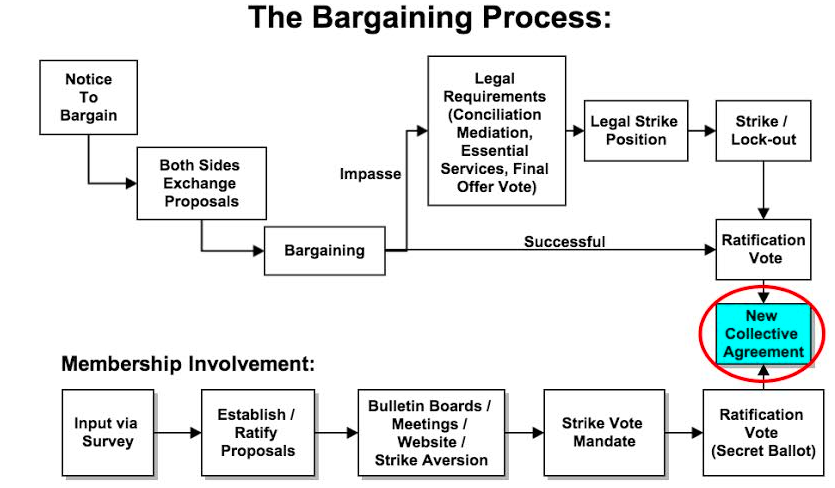|
The Union’s Bargaining Committee had a meeting in March 2020. They are working on a survey for the membership, and have started compiling ideas for proposals. If you have any ideas for the Bargaining Committee, they would love to hear from you!
0 Comments
Though the collective agreement has expired, the rights set out in it continue to apply. We, as unionized workers, are all still entitled to the same working conditions, wages and benefits as during the last collective agreement.
Any violation of these provisions by the Employer continues to be a violation as it would have been before the expiry date. If you know of a violation, please bring it to the attention of a steward or the executive committee so that we can determine how best to act on it. The notice to bargain has been sent to, and was received by the Employer.
The Employer and Union have not scheduled bargaining dates yet. Our new Collective Agreement terms are until March 31, 2017. Thank you for everyone's support during bargaining.
At our last membership meeting, CUPE 960 members unanimously voted in favour of setting aside a very sizeable strike fund. In unanimous support, it was moved that: The membership of CUPE Local 960 fully supports the efforts of the CUPE 960 bargaining team and maintaining the integrity of past negotiated agreements. CUPE 960 has been working under an expired contract since March 2014. On Wednesday, December 10, 2014 CUPE 960 filed for conciliation. What is conciliation? Conciliation is a process by which a trade union or an employer can ask the Ontario Ministry of Labour for help in resolving their differences so that they can reach a collective agreement. Either party may apply to the ministry. If parties are in negotiations, they must use, the government's conciliation services before they can get into a position to engage in a strike or lock-out. What if the employer and the union cannot reach agreement in conciliation? The conciliation officer informs the Ontario Minister of Labour that a collective agreement was unable to be effected. The minister would then generally issue a notice informing the union and the employer that he or she "does not consider it advisable to appoint a conciliation board" (section 21(b) of the act). This notice is known colloquially as the "no board". [Conciliation boards are exceedingly rare. They have not been appointed in recent years.] What further assistance is available to the bargaining parties after a "no board" gets issued? If the parties have not reached a settlement in the conciliation stage, the ministry continues to offer the services of a mediator who will confer with the parties and endeavour to effect a collective agreement. This is referred to as the mediation stage, a process by which a third party attempts to help a trade union and an employer in reaching a collective agreement. Since mediation is discretionary, the service is only used if both parties agree to it. We will be in touch with members about the mobilization committee and more as we have more information.
Please email [email protected] with any questions or phone 905-924-3932. As we continue to head into the negotiation of our collective agreement this winter – we thought we’d post FAQs about collective bargaining between CUPE 960 and OPL. This is subject to change – if you have any other questions to add please contact us at [email protected]
Collective Bargaining FAQs What is collective bargaining?
When is the union going to meet with the employer?
Steps for Collective Bargaining
CUPE 3902 made a really awesome bargaining flow chart to help illustrate the process. Have a look here. |


 RSS Feed
RSS Feed
